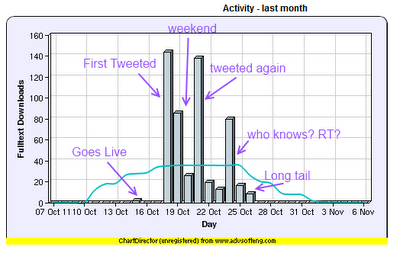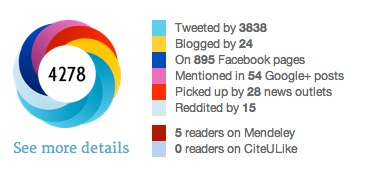When research is created, authors are keen to measure impact and how it influences both academia and the wider world. One key way of measuring the impact or the value of research is through citation counts – by this we mean how many times it’s been cited in other pieces of research.Social media has opened up a number of possibilities to increase citation counts as it gives researchers more opportunities to publicise their research and also for other researchers to flag up articles they’ve read. Researchers are now more aware of work they otherwise wouldn’t have known about and there’s now more scope for their own to be influenced by this. Research has been carried out into the effects of social media on citations. Does it really allow a greater dissemination and impact of research as the theory would suggest?
More modest researchers might not be keen to over-promote themselves and their research but there really is no point in being shy. Melissa Terras, the Director of UCL Centre for Digital Humanities wrote an excellent article a few years ago that identified a clear correlation between talking about her research through Twitter and blogging and the number of downloads of her research from UCL’s institutional repository. Her initial aim was “to tell the stories behind the research – the things that don’t get into the published versions”. She quickly discovered that three simple blog posts got 20,000 hits.

By blogging and tweeting about all her research, papers that had only been read a couple of times previously were now downloaded over 500 times, from all over the world, within a week!
Likewise, Eysenbach (2011) wrote a piece in the Journal of Medical Internet Research that asked whether tweets can predict citations. The research was undertaken between 2008-2011, coinciding with the rise in altmetrics. When articles were published, they were simultaneously tweeted. Eysenbach found that tweets can predict highly cited articles within the first few days and can increase citations. However, this often reflected the underlying qualities of articles, e.g. if they were written on timely or interesting topics!
Of course since then altmetrics has rapidly grown and been accepted as an alternative to more traditional metrics, such as impact factor and h-index.Altmetrics measure the conversations taking place about research. Perhaps on databases or discovery tools, you’ve seen the Altmetric ‘donut’ next to articles.

So the advice is: blow your own horn! When you write something, tweet/blog it. When you read something interesting, tweet it. Watch the traditional citation counts explode and use altmetrics to capture how much attention your research is getting on social media.
Eysenbach, G. (2011) Can tweets predict citations? Metrics of social impact based on Twitter and correlation with traditional metrics of scientific impact. Journal of Medical Internet Research, 13(4).
Terras, M. (2012) The impact of social media on the dissemination of research: results of an experiment. Journal of Digital Humanities, 1(3).